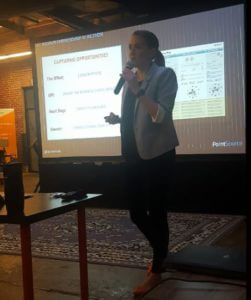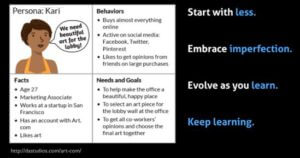Did you miss our April event? Triangle Marketing Club had yet another awesome event with many talented marketers, students, and a lot of networking. We had some new flavors from Compass Rose Brewery and cheesy bread from Marcos Pizza as our snack for the evening. This event was a little bittersweet as we said farewell to our two senior interns, Candace Carter and Emma Brothers, who have worked hard throughout the years with TMC.
Triangle Marketing Club has some really exciting news! Our website now ranks number one for triangle agencies on Google! We would like to say thank you to all of our sponsors as well! Our Springboard Promotions Giveaway this month was a really cool laptop case! LiveNation is throwing a summer kickoff celebration! Lucky winners could get season passes to Walnut Creek and Red Hat! TMC also introduced our new sponsor Oak City Properties in a better well known segment. Come check out this great company for all your property management needs!
 Have you ever heard of journey mapping? Cait Smith, director of Digital Strategy at PointSource shared her experience on the topic of Journey Mapping for Marketers & Makers. “The CMO and CIO relationship is becoming one of the most important C-suite collaborations when it comes to delivering the kinds of digital experiences that customers demand.” According to the McKinsey Consumer Experience Report 2016, 25% of customers will defect after just one bad experience. PointSource Executing Digital Transformation Survey 2017 confirms that 51% of respondents say their organization addresses specific needs across all platforms, channels, and devices.
Have you ever heard of journey mapping? Cait Smith, director of Digital Strategy at PointSource shared her experience on the topic of Journey Mapping for Marketers & Makers. “The CMO and CIO relationship is becoming one of the most important C-suite collaborations when it comes to delivering the kinds of digital experiences that customers demand.” According to the McKinsey Consumer Experience Report 2016, 25% of customers will defect after just one bad experience. PointSource Executing Digital Transformation Survey 2017 confirms that 51% of respondents say their organization addresses specific needs across all platforms, channels, and devices.
What is a Journey Map?
Cait explained that journey mapping is a tool to help us understand a situation from someone else’s point of view. Journey maps are used to understand how customers think from start to finish. This tool is beneficial because it creates common goals and vision. Journey mapping can also uncover some hidden truths that you may not already have known before. However, journey mapping may be a little frustrating when you are trying to understand the process and scope. So why journey map you may ask? Here are some great reasons!
- Cultivate empathy and a shared view of customers
- Build strategic alignment
- Surface moments of truth
- Highlight opportunities to reduce friction
- Jumpstart ideas for deeper engagement and delight
8 Guiding Principles
There are eight guiding principles to create a successful journey map. Journey maps can be very diverse as they may be made for a variety of reasons. Cait showed us that these eight steps can be divided into three sections: prepare, map, and act.
Prepare
The first step is to state your intent. Begin with the lens or POV, then state your initial scope, and finally plan how to apply insights. The second step is to bring qualitative research and the third step is to get the right people in the room. These three steps are part of the prepare aspect of journey mapping.
Map
Next, you define the persona based on patterns and shared attributes from your qualitative research. Cait mentioned that a persona is a representation of a unique behavior profile. Characteristics of a persona include attitudes, motivations, pains, preferences, work styles, and beliefs. It is important to capture what is most relevant to your team or organization. Once you have defined the persona, you now have the ability to plot the experience. It can be very helpful to complete a journey map collaboratively. Cait emphasized the importance of making people write. Also, remember that polish is nice, but it is not the point of the journey map!
the persona based on patterns and shared attributes from your qualitative research. Cait mentioned that a persona is a representation of a unique behavior profile. Characteristics of a persona include attitudes, motivations, pains, preferences, work styles, and beliefs. It is important to capture what is most relevant to your team or organization. Once you have defined the persona, you now have the ability to plot the experience. It can be very helpful to complete a journey map collaboratively. Cait emphasized the importance of making people write. Also, remember that polish is nice, but it is not the point of the journey map!
“A picture can connect the strategic with the tactical in a way no other communication form possibly can” –Dave Gray
Act
In order to act, the first step is to locate the pain. Find patterns and then categorize the information based on these patterns. Brainstorm around these pain themes once the patterns have been located and organized into groups. The second step is to surface opportunities. In order to do so, ask the following questions.
- How can we reduce friction?
- What areas are ripe for disruption?
- Where can we harness customer data to improve our services?
- Where will specific content and targeted messaging make an impact?
The final step of the eight guiding principles is to assign ownership and action. After this step, it is safe to say that you have completed your journey mapping activity.
What Happens Next?
 You are at the stage where you have completed your journey map, so what is on your to do list after that? Start with prioritizing your opportunities. See which of these opportunities appears to be the most appealing. Next, research each opportunity to validate your assumptions. Create roadmap updates, content, or features. Lastly, set up tests and experiments to see what works best. Cait said “if a brand looks like a duck and swims like a dog, people will distrust it. Don’t be like this!
You are at the stage where you have completed your journey map, so what is on your to do list after that? Start with prioritizing your opportunities. See which of these opportunities appears to be the most appealing. Next, research each opportunity to validate your assumptions. Create roadmap updates, content, or features. Lastly, set up tests and experiments to see what works best. Cait said “if a brand looks like a duck and swims like a dog, people will distrust it. Don’t be like this!
Don’t forget to RSVP to our May event featuring speaker Michael Barber. He will be presenting on the topic “Friction – It’s All That Matters! Remember that this event will be on Wednesday May 24, 2017, instead of a Tuesday, at 6pm in KnowledgeTree!
